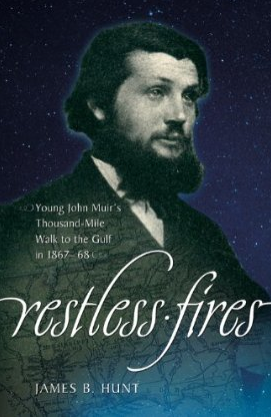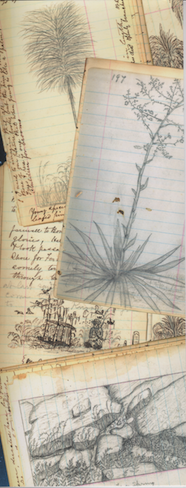the john muir exhibit - bibliographic_resources - book_jackets - restless fires: young john muir's thousand mile walk to the gulf in 1867-68
Restless Fires: Young John Muir's Thousand Mile Walk to the Gulf in 1867–68
by James B. Hunt

(
from the book's dust jacket - back cover
)
Restless Fires: Young John Muir's Thousand Mile Walk to the Gulf in 1867–68 by James B. Hunt (Macon, GA: Mercer University Press, 2012); Hardcover. Includes many images from John Muir's journal, Selected Bibliography, Notes, Acknowledgments, Index; hardbound with dust jacket. 235 pages. ISBN-10: 0881463922.
[Flyleaf]
 Left panel includes photographic reproductions of Muir's drawings from his Thousand Mile Walk Journal; right panel includes author photo and bio.
Left panel includes photographic reproductions of Muir's drawings from his Thousand Mile Walk Journal; right panel includes author photo and bio.
[Back cover - brackets indicate added language on publisher's website not incorporated on the cover.]
Restless Fires provides a detailed rendering of John Muir’s thousand-mile walk to the Gulf based on both manuscript and published accounts. Hunt particularly examines the development of Muir’s environmental thought as a young adult. Muir experienced delight in seeing nature anew after recovering from partial blindness [due to a factory accident].
He witnessed the Civil War’s and Reconstruction's [devastating] impacts on communities, individuals, and the environment [towns, villages, and people]. This is one of the first books on John Muir’s thousand-mile walk that places his journey in the context of the Civil War and Reconstruction[, to which Muir gave only passing witness].
Through these experiences and reflections, Muir came to radical views regarding humankind’s relationship to nature, death, and faith. Muir suffered hunger, felt pangs of loneliness, slept five days in a cemetery, slogged through swamps, and nearly died of malaria. The legacy of this walk is found in Muir’s perceptive insights generated in part by his background and reading, and by his experience with the Southern environment and its people and plants during the walk.
His journal gives evidence of a young man resolving what he wants to do with his life. Muir comes to profound insights as to how human beings fit into nature.
[A walk in nature gave humans a sense of their limits, a lesson in humility.] In Muir’s view, nature provides humans a moral touchstone when they recognize their small part in the “divine harmony.†Muir wrote that when he simply went out for a walk in nature, he was really “going in.†This book explores what Muir meant.
"Hunt brings new insight and fresh enthusiasm to this engaging study of the legendary American conservationist. Drawing extensively on Muir's diary and correspondence, the author adds significantly to our knowledge of the context of what became a pivotal moment in Muir's Life."
- Donald Worster, author of A Passion for Nature: The Life of John Muir
In Jim Hunt's Restless Fires, delighted readers will walk with John Muir through the post-civil War South as the wandering young botanist discovers his vocation as America's great environmental pioneer. Hunt's insightful examination of Muir's journal, rooted in his own expertise in the impact of travel on young adults, will be appreciated by both old-time Muir hands and general readers. And, as the author suggests, the ultimate benefit of traveling with Muir may be to open our eyes to new ways of looking at nature.
- Ronald C. White, Jr. author of A. Lincoln: A Biography
About the Author
James B. Hunt is professor emeritus of History at Whitworth University in Spokane, Washington, and cofounder of the Krista Foundation for Global Citizenship. Hunt taught American, Latin American, and World history while at Whitworth. For twenty-five years, he provided faculty leadership to students traveling to Central America for Whitworth s[ five months] study/service program. This led to his compelling interest and writing on the impact of youthful travel on such American leaders as John Quincy Adams, Frederick Douglass, Jane Addams, and John Muir.
Cover Design: Burt&Burt
Mercer University Press
www.mupress.org/
See also:
Return to Book Jackets
Return to Bibliographic Resources